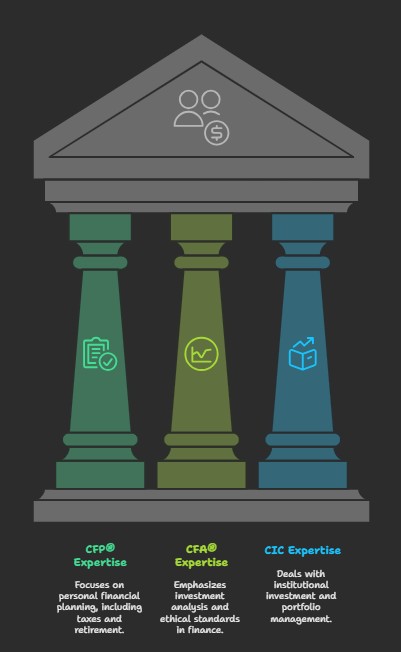Things to Ask Your Financial Advisor for Better Wealth

When we’re discussing major money moves, there are several essential things to ask your financial advisor. These questions help us feel more confident in our wealth management decisions and ensure we’re partnering with someone who genuinely understands our goals. Below, we’ll walk through the key points you can raise with a prospective advisor, so you can protect and grow your assets with clarity and peace of mind.
Set Clear Goals
Before we start talking fees, credentials, or strategies, we want to get super clear on what we hope to accomplish. Are we focusing on preserving capital, supporting family members, or scaling up our portfolio for future generations? Think of this as our North Star, guiding every conversation with an advisor.
- Jot down major life events, like retirement dates or potential liquidity events
- Identify personal milestones (college funding, new ventures, charitable giving)
- Consider long-term timelines and potential market shifts
When we know exactly where we’d like to end up, it’s easier to assess whether an advisor’s approach can get us there.
Confirm Credentials And Certifications

If our goal is better wealth management, we should confirm that the person handling our capital has top-notch qualifications. Different designations reflect different specializations. For instance, a Certified Financial Planner (CFP®) completes extensive coursework on topics like taxes, investments, retirement, and estate planning. Meanwhile, Chartered Financial Analysts (CFA®) concentrate on portfolio management, economics, and ethics.
- CFP®: focuses on comprehensive financial planning
- CFA®: emphasizes investment analysis and portfolio management
- CIC (Chartered Investment Counselor): typically targets large-scale portfolio strategies
According to the FMA, these designations require rigorous exams and ongoing education, which often indicates a strong commitment to ethical and professional standards. If you want more insight into what makes outstanding advisors tick, check out what makes a great financial advisor.
Understand Fee Structures
Never be shy about asking how your advisor gets paid. Some advisors charge based on assets under management (AUM). Others might use a flat yearly fee, an hourly rate, or a one-time project fee. According to NerdWallet, a 1% AUM fee is a standard rate, but robo-advisors can charge as little as 0.25% in some cases.
Here’s a quick overview of common fee structures:
| Fee Structure | Typical Range |
|---|---|
| AUM Fee | 0.25% – 2% per year |
| Flat Annual/Monthly Fee | $2,000 – $7,500 (annual) |
| Hourly Rate | $200 – $400 per hour |
| One-Time Plan Fee | $1,000 – $3,000 per plan |
| Commission | 3% – 6% on certain products |
We should look for an arrangement that makes sense for our portfolio size and complexity. If you want to learn about different pay models, you can check financial advisor hourly rate for more details on how hourly options might fit your needs.
Explore Investment Philosophy
Advisors use different approaches, from indexing to active management. Some rely on model portfolios, adjusting them based on your risk tolerance and financial goals (Investopedia). Others favor low-cost index funds, citing expert research that it’s tough to outperform the market over time.
Key follow-up questions might include:
- “Do you prefer active management, passive investing, or a mix?”
- “Which tools or research (such as Dimensional Fund Advisors) do you consult?”
- “How do you assess and adjust my portfolio over time?”
Asking about these details raises our comfort level and helps us ensure the advisor’s philosophy aligns with our own.
Clarify Communication And Support

We want to know exactly how often we’ll check in, how we’ll communicate, and what happens if we have questions in-between. Will our advisor be available for quick phone calls, or do we schedule virtual reviews? Sometimes, an advisor might meet monthly at first, then shift to quarterly reviews once a plan is in motion.
- Request clarity on response times (e.g., within 24 hours or 48 hours)
- Confirm if there’s an online dashboard for real-time portfolio tracking
- Ask about official reviews and progress reports
If you’re wondering whether it’s beneficial to maintain a long-term relationship with a single advisor, you might explore is it worth it to have a financial advisor.
Consider Risk Tolerance And Capacity

A strong advisor typically begins by assessing our ability and willingness to handle market drops. Risk tolerance measures our emotional comfort with watching our portfolio lose value in a downturn, while risk capacity looks at factors like time until retirement and overall wealth. According to Investopedia, matching our risk profile to the right investments is crucial to weather market volatility.
- Calculate our time horizon for big financial goals
- Discuss leftover financial resources if market values dip
- Ask if they use risk simulations (like Monte Carlo) to plan for various scenarios
Summary And FAQs
When it comes to securing our long-term wealth, asking the right questions can make all the difference. Checking certifications, understanding fees, clarifying communication, and ensuring the investment approach aligns with our comfort level all combine to give us peace of mind. And in case you’re wondering, here are five frequently asked questions about things to ask your financial advisor: “What is your fee structure?,” “How do you determine investments for my goals?,” “Will you act as a fiduciary near me?,” “How often should we meet for reviews?,” and “Which certifications prove your expertise?”
By tackling these crucial topics early, we gain a stronger grasp on how our advisor will guide us toward success. If you’d like additional tips, you can explore choosing a financial advisor to dig even deeper into the selection process. We find that a transparent relationship with a knowledgeable professional is often the key to protecting assets for the next generation—while helping us rest a little easier today.
Recent Posts
Financial Advisors in Los Angeles to Consider
Finding the right financial advisor can be a pivotal step...
Financial Advisors in New York to Consider
Selecting the right financial advisors in New York can play...





